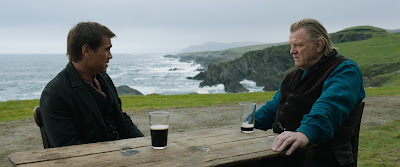While The Banshees of Inisherin doesn’t deviate from that foundation, at first, McDonagh’s film seems like a quaint, rural tale of a grudge between two blokes from a century ago who live on an island off the west coast of Ireland. But the sense of horror soon ratchets up and up and up as a threat is first made, and then followed through with devasting consequences.
One day Colm wakes up and – hit by a depressed sense that he’s frittering away his days on this earth – decides that his dull mate Pádraic is no longer his friend. So he reneges on the daily ritual of going for a pint in the local pub at 2pm. Instead he composes an air for the fiddle and insists that Pádraic no longer make contact.Brendan Gleeson is excruciatingly stubborn as Colm. He takes on the gait of an ogre from a myth as he ambles along the country lanes. Colin Farrell’s Pádraic is inane, with little self-awareness, a “whiny little dull-arse”! Until now, everything in life has revolved around his own wants and needs. He’s had a friend to talk to, a miniature donkey to spoil around the house as a pet, and a sister to look after him. Soon all of those crutches are put at risk.
The brightest person on the island – in terms of intelligence and fashion – is Pádraic’s sister Siobhán. She’s bookish, underappreciated and harbours ambitions that would lead her to the mainland. Kerry Condon gives the Siobhán an understated depth, struggling to believe the actions and motivations of the mad men that surround her, and slowly running out of patience. Other than Siobhán, the women in this character study of stubbornness and hostility are largely ancillary. The interfering post mistress moves the plot on; the wizened Mrs McCormick makes bold predictions.Another tragic islander is young Dominic. While Siobhán gently but firmly spurns his advances, Dominic is also carrying the weight of the demons that come from being the son of the drunken and abusive local police officer. Barry Keoghan brings intrigue and pathos to a role that McDonagh uses to add to the growing pile of misfortune and heartbreak.
Tragedy seems to rush in to fill a vacuum of hope on Inisherin. It’s set against the background of the civil war, a conflict – somewhat misunderstood and ignored – that the island is insulated from by a thin strip of water. McDonagh explores what it means to be kind, whether it’s a virtue or ultimately a vice.
Sitting back in the comfy cinema seat, I couldn’t help wonder if the allegory could be fitted to the recent stand-off between the DUP’s Jeffrey Donaldson and Secretary of State Chris Heaton-Harris, each squaring up the other and not wanting to back down. Except the SoS lost his scissors and didn’t go through with the threat …
The Banshees of Inisherin is a superbly black comedy, so dark that it veers into unexpected horror. There’s a twist of Beckett in the air too. Expect it to be up for multiple nominations in the Academy Awards.
Enjoyed this review? Why click on the Buy Me a Tea button!



No comments:
Post a Comment